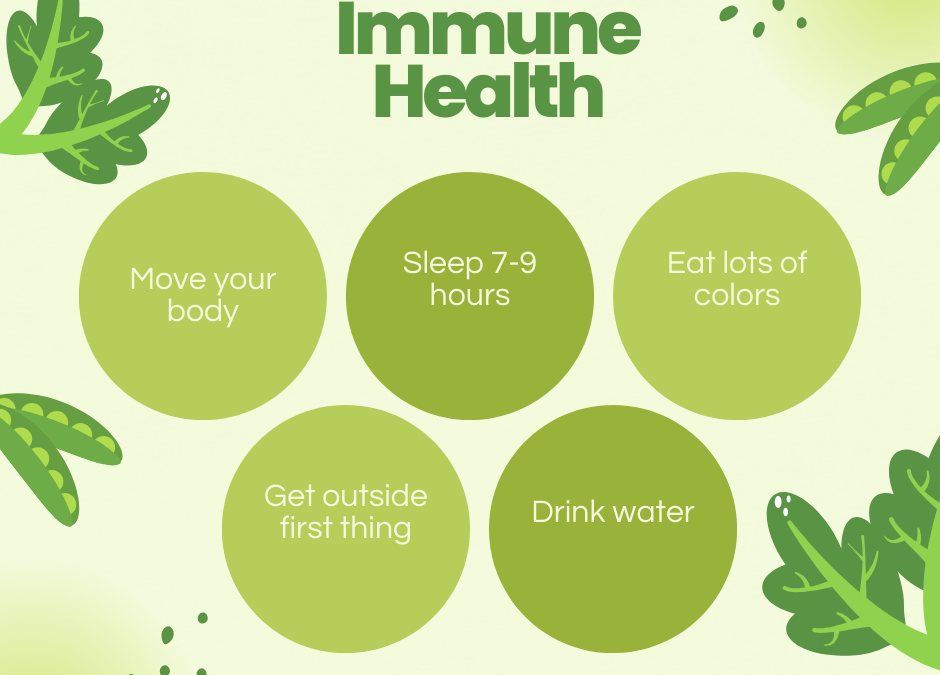In recent years, the importance of the gut microbiota has come more clearly into the picture as playing an important role in immune-related diseases, and even in regulating predisposition to diseases. (1) The microbes found within the body help to digest food and play a large role in the immune system (1). It is known that the more diverse microbiota, the stronger the immune system. A diverse maternal microbiome, healthy diet and exposures, and supplementing with probiotics during pregnancy are thought to decrease allergy susceptibility in infants, and after delivery, can possibly help decrease postpartum depression symptoms.
PROBIOTIC SUPPLEMENTATION DURING PREGNANCY & ALLERGIES
While diet and environmental exposures play a role, recent studies have found that supplementing with probiotics BOTH during pregnancy and post-delivery helps to prevent allergic disease, with the exception of immunoglobulin E, IgE allergies (2). Food allergies are considered either IgE – mediated or non-IgE- mediated.
Immunoglobulin E (IgE) are antibodies produced by the immune system, and if you have an allergy, your immune system overreacts to it. These antibodies travel to cells that release chemicals, causing usually an immediate allergic reaction such as hives, vomiting, red skin or anaphylaxis (5). IgE allergies are food allergies that can be tested easily, and can have severe immediate reactions.
Non – IgE mediated food allergies, also known as food sensitivities, are caused by a reaction involving other components of the immune system, and typically cause gastrointestinal reactions such as bloating, gas or diarrhea. These symptoms typically occur hours later. The difficulty with Non-IgE mediated food allergies is that they cannot be found easily through tests, rather through observing symptoms, and an elimination diet. In studies with pregnant women, the two strains used were Lactobacillus by itself or Lactobacillus with Bifidobacterium. Lactobacillus rhamnosus cfu/day given daily to pregnant mothers from 35 weeks gestation to 6 months postpartum in breastfeeding infants (until 2 years of age) reduced the prevalence of eczema by 50% at age 2, 4 and 6 (2). Another study started probiotic supplementation much earlier, starting at 14-16 weeks gestation. This makes sense as fetal production of IgE antibodies occurs before the end of the first trimester and allergen-specific IgE antibodies towards the end of the second trimester [4]. This study suggested those with infants prone to allergens, where the mothers had allergies, would benefit from maternal supplementation of probiotics starting early in pregnancy. (2)
OTHER FACTORS
Of course, the diet and environmental exposures and lifestyle are also huge factors in the gut microbiome and its diversity. You can read more information on foods to include in your diet
POSTPARTUM DEPRESSION
Studies conducted on animals have found that probiotic supplementation post-childbirth can help with postpartum depression, but no human studies have yet been completed (2).
Serotonin is a neurotransmitter that controls many functions within the body, including sleep, appetite, temperature, and the most well known factor, mood. Most commonly, pharmaceuticals are prescribed for depression, such as selective serotonin re-uptake inhibitors (SSRIs) (2). SSRIs block the reabsorption of serotonin in the brain so that more serotonin is available. With the gut-brain-serotonin connection so evident, it would be prudent to try taking probiotics before drugs with many side effects.
CONCLUSION
A healthy microbiome is very closely linked with the immune system and immune response, and the brain-gut connections even link the microbiome to mood. Supplementing with probiotics through pregnancy and during breastfeeding would absolutely be something to consider if you are starting a family. One of my favorite brands is below.
SOURCES
(1) Cenit, MC, Matzaraki, V, Tigchelaar, E, Zhernakova, A. Rapidly Expanding Knowledge on the role of the gut microbiome in health and disease. https://www.ncbi.nlm.nih.gov/pubmed/24882755/
(2) Barthow, C., Hood, F., Crane, J., Huthwaite, M., Weatherall, M., Parry-Strong, A., & Krebs, J. (2022). A randomised controlled trial of a probiotic and a prebiotic examining metabolic and mental health outcomes in adults with pre-diabetes. BMJ open, 12(3), e055214. https://doi.org/10.1136/bmjopen-2021-055214
3) Wickens, K., Black, P. N., Stanley, T. V., Mitchell, E., Fitzharris, P., Tannock, G. W., Purdie, G., Crane, J., & Probiotic Study Group (2008). A differential effect of 2 probiotics in the prevention of eczema and atopy: a double-blind, randomized, placebo-controlled trial. The Journal of allergy and clinical immunology, 122(4), 788–794. https://doi.org/10.1016/j.jaci.2008.07.011
4) Chen, Y., Lu, J., Wickens, K., Stanley, T., Maude, R., Stone, P., Barthow, C., Crane, J., Mitchell, E. A., Merien, F., & Murphy, R. (2021). Effect of Lactobacillus rhamnosus Probiotic in Early Pregnancy on Plasma Conjugated Bile Acids in a Randomised Controlled Trial. Nutrients, 13(1), 209. https://doi.org/10.3390/nu13010209
5) Khalesi, S., Bellissimo, N., Vandelanotte, C., Williams, S., Stanley, D., & Irwin, C. (2019). A review of probiotic supplementation in healthy adults: helpful or hype?. European journal of clinical nutrition, 73(1), 24–37. https://doi.org/10.1038/s41430-018-0135-9
6) Barthow, C., Wickens, K., Stanley, T., Mitchell, E. A., Maude, R., Abels, P., Purdie, G., Murphy, R., Stone, P., Kang, J., Hood, F., Rowden, J., Barnes, P., Fitzharris, P., Craig, J., Slykerman, R. F., & Crane, J. (2016). The Probiotics in Pregnancy Study (PiP Study): rationale and design of a double-blind randomised controlled trial to improve maternal health during pregnancy and prevent infant eczema and allergy. BMC pregnancy and childbirth, 16(1), 133. https://doi.org/10.1186/s12884-016-0923-y

